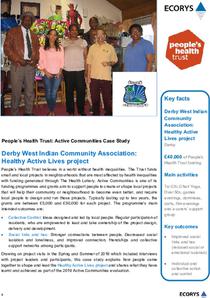Who
The project was aimed at older people from black and minority ethnic communities, particularly people aged over 50, carers and people who were socially isolated.
Main activities
Tai Chi, Chair Yoga, Over 50s, games evenings, dominoes, darts, film evenings and a carers’ support group
Where
Derby
Key outcomes
- Improved social links and ties
- Individual and collective action and control
- Increased confidence, knowledge, skills and assets.
When
2018 - 2020
What has the project achieved?
The project built stronger connections within the community, enabling friendships between the members and helping them to develop improved social networks. It also created an environment where members were receptive to health awareness messages delivered through community-led events.
Improved social links and ties
Outcomes:
- Reduced social or emotional isolation
- Improved mental and physical health
- New social links and networks.
Healthy Active Lives proved successful in combating isolation and improving social links for participants, because meeting and making friends was a big part of the activities.
The project was strongly rooted in the community, and the furthest that participants travelled to attend project sessions was three or four miles. This was a hub located within the community it served and designed by residents to meet local needs.
Activities were well attended, with word of mouth and ‘bring-a-friend’ schemes proving their popularity. Wider friendships also grew out of these activity sessions. For example, a small group of women who met at the tai chi class began their own rambling group to take outdoor walks together.
Along with this anecdotal evidence, evaluation forms showed the project’s impact on individual participants, reducing their sense of isolation and improving their health and wellbeing and their mental health.
We try and build a good social network here so people can laugh, reminisce. If you see someone have a good belly laugh it’s amazing. It’s good to talk and remember something from way back when.
Project Co-ordinator
Individual and collective action and control
Outcomes:
- Community decision making
- Member-led activities
- Volunteer Health Champions
- Social action.
The community-led ethos of the project meant that it was important to enable and support members in leading, shaping and developing activities. Activities were designed around the needs of those who would benefit from the project, for example providing evening and weekend sessions so that people over 50s who were going to work would not miss out.
Both the project leader and the project coordinator were members of the local West Indian community, and many members volunteered to co-ordinate sessions, activities or events.
A group of 12 volunteer Health Champions, members of the local community with expertise in health, met regularly to share ideas and plan health-related initiatives and events. This group also raised concerns about local services for older people, particularly how social care and health services could be improved for minority elders. This issue was then picked up by the wider association management.
In recent years a group has developed where they’re planning activities within the centre, for example a gospel extravaganza this weekend. It’s nice to see that born out of what’s happening here.
Project Co-ordinator
Increased confidence, knowledge, skills and assets
Outcomes:
- Organisational skills and confidence
- Improved health outcomes
- Health awareness.
Organisational skills and confidence grew among members as different groups took responsibility for their own activities. For example the darts and dominoes group, which met at the centre every week, planned and organised inter-community ‘away’ games as part of a tournament.
Some participants reported long-term health benefits from attending sessions such as tai chi. These professionally-led activities were beneficial for health and wellbeing and for building and maintaining physical, mental and social skills.
Significant impact came from the events organised in partnership with the council’s public health team, covering issues such as heart conditions, stroke and diabetes. In the past, health services had struggled to reach the West Indian community but it helped that these awareness events were in a community setting. The result was that community members became more confident in discussing health issues and in managing their personal health.
Basically, it’s health awareness to let the community be aware of aspects of their conditions. I find this very effective. Wherever I go, they [community members] are invariably asking me to come back and answer questions.
Health Champion Volunteer
Lessons for other projects
- Different levels of participation opened the project to different sorts of people, but there could be more integration between the groups.
- The project benefitted from strong and growing partnerships.
- Strong and consistent leadership helped the project to thrive, but this raised questions about succession and long-term sustainability.
About the evaluation
The project was evaluated by Ecorys as part of the 2018-2019 independent evaluation of the Active Communities programme. The evaluation drew on project visits in the spring and summer of 2019 which included interviews with project leaders and participants.
The project was funded by People's Health Trust through Health Lottery East Midlands, as part of the Trust's Active Communities programme.

